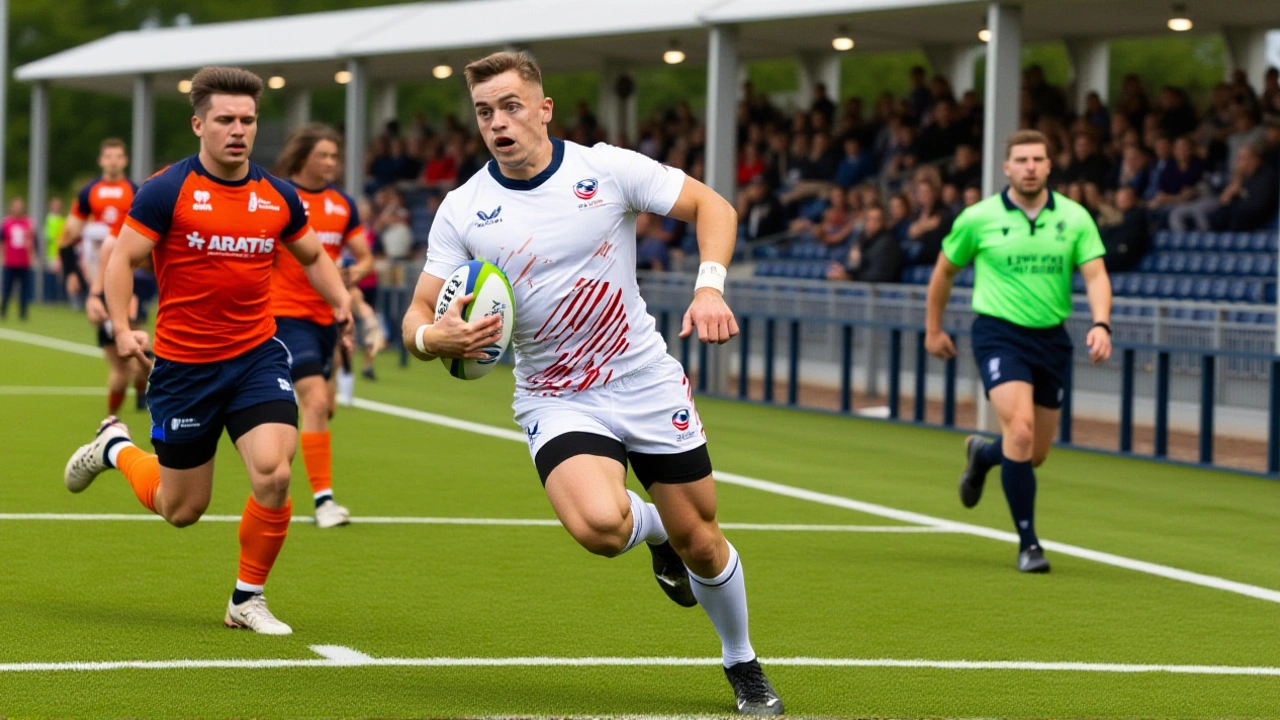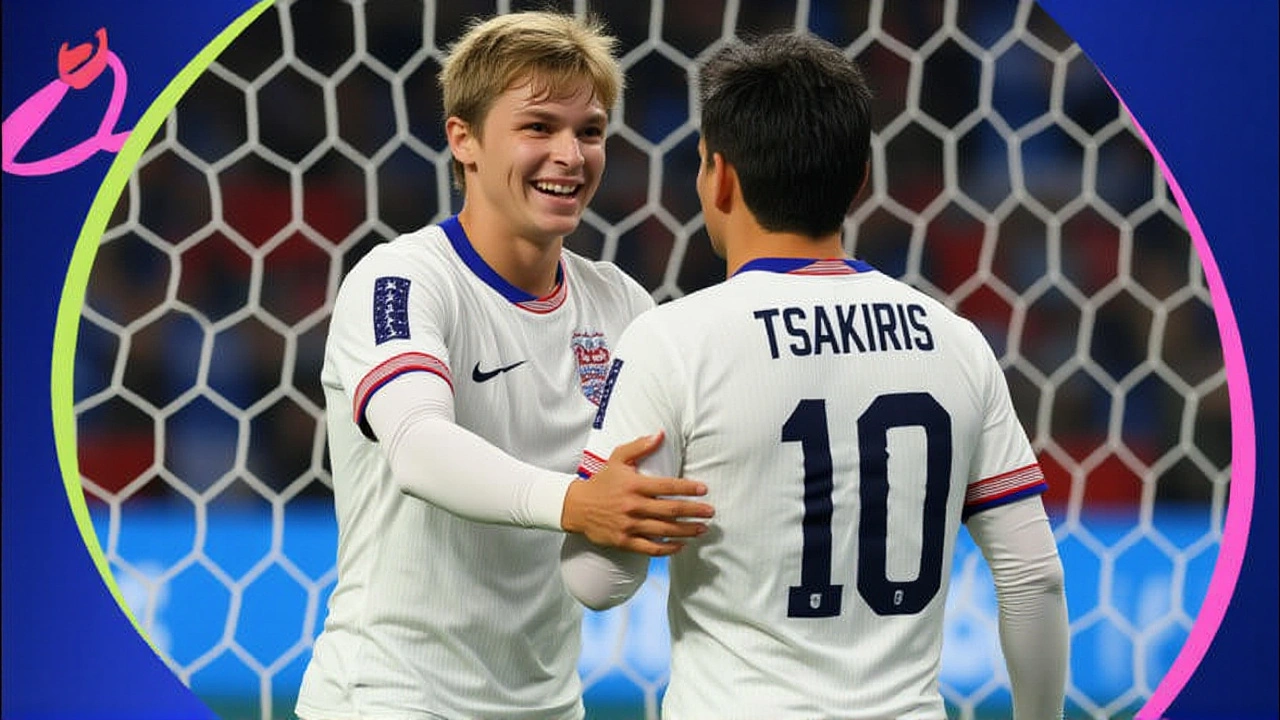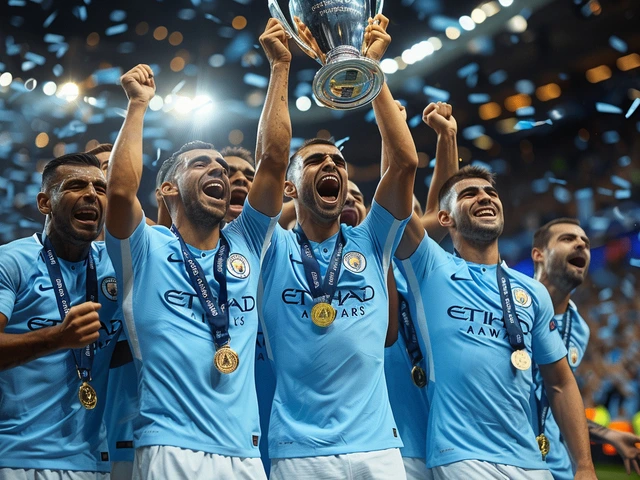When United States Under-20 Men's National Team rolled onto the pitch at Estadio El Teniente in Rancagua, Chile, on September 29, 2025, nobody could have guessed the carnage that would follow. The Americans detonated nine goals against debutants New Caledonia, delivering a 9‑1 thrashing that will live on in FIFA U‑20 World Cup lore. Benjamin Cremaschi grabbed a hat‑trick, while the whole squad set a new record for most different scorers in the first two matches of a tournament.
Why This Match Matters
New Caledonia’s appearance was historic in itself – it was the Pacific island’s first foray into any FIFA World Cup, senior or youth. For the United States, the result was more than a confidence boost; it signalled a generational shift in American soccer, with a crop of players who can score at will on the world stage. The win catapulted the USA to the top of Group E with a plus‑8 goal difference, putting them a clean sweep away from securing the group crown.
Match‑by‑Match Breakdown
The opening whistle kicked off a relentless American onslaught. Niko Tsakiris opened the floodgates in the seventh minute, threading a low drive past the New Caledonian keeper. Just minutes later Francis Westfield doubled the tally at the 28th minute. But the real fireworks began in the first half: Benjamin Cremaschi struck at 2, 4 and 37 minutes, the first two coming within a two‑minute window and both from point‑blank range.
By halftime the score read 7‑0. Nolan Norris added a brace – one in the 35th, another right before the break at 44 – while the back‑line, marshalled by goalkeeper Adam Beaudry, looked barely troubled. The second half turned more measured. Taha Habroune nudged in the 68th minute and Cole Campbell capped the night at 73. New Caledonia finally got on the scoresheet through Antoine Simane in the 70th minute – a consolation that, despite the blowout, will forever be recorded as the island’s first World Cup goal at any level.
Stars of the Show
Benjamin Cremaschi emerged as the headline act, his hat‑trick underscoring a poise rarely seen in a player under 20. In post‑match interviews, Cremaschi credited his teammates for creating space and said, “When the ball lands at my feet, I just try to make it count.” His two early goals, both from inside the six‑yard box, forced New Caledonia’s defense to scramble, opening lanes for the likes of Gozo and Zambrano‑Delgado.
Midfield dynamo Brooklyn Raines dictated tempo, linking defence to attack with crisp passes that repeatedly split the opposition line. Even though Raines didn’t score in this particular match, his work laid the groundwork for the later 3‑0 win over France, where he netted a late strike.
Goalkeeper Adam Beaudry faced a barrage of shots, but his composure was evident – he recorded seven saves and only conceded once, a testament to the defensive solidity of the back four: Norris, Wynder, Kohler and Westfield.
Reactions From Around the Globe
FIFA’s tournament director described the affair as “a master‑class performance that sets a new benchmark for attacking football at the U‑20 level.” In New Caledonia, the team’s coach admitted the defeat was painful but praised his players for “earning a place in history with that first World Cup goal.”
Back in the United States, U.S. Soccer President Sunil Gulati hailed the result as “the beginning of a new era for American soccer,” adding that the depth of talent bodes well for the senior national team’s future World Cup campaigns.

What This Means for Group E
After the 9‑1 rumble and a subsequent 3‑0 victory over France on October 2, the USA sits atop Group E with six points and a plus‑11 goal difference. France and South Africa are dead‑locked on three points each, while New Caledonia linger at the bottom with zero. The final group match against South Africa on October 5 will be a formality for the Americans – a draw is enough to seal first place.
Analysts note that the USA’s ability to score against varied opposition – a disciplined French side and a physically imposing South African team – signals tactical flexibility that could serve them well in the knockout stages.
Looking Ahead: The Road to the Knockouts
If the USA can keep its defensive backbone intact while preserving the attacking freedom displayed in Rancagua, they’ll be a serious threat beyond the group phase. The coaching staff, led by Dave Sarachan, has already rotated the squad to keep legs fresh, a strategy that may pay dividends when they face the typically gritty South American opponents slated for the round of 16.
For New Caledonia, the focus now shifts to rebuilding. Their debut, while brutal, offered invaluable experience, and federation officials are already scouting domestic talent to bridge the gap before the next continental qualifiers.
- USA tops Group E with 6 points.
- Goal difference: +11.
- Record: nine different scorers in first two matches.
- New Caledonia’s first-ever World Cup goal by Antoine Simane.
- Final group game: USA vs South Africa, Oct 5, 4 p.m. ET (FS2/Telemundo).
Frequently Asked Questions
How does this result affect the United States' chances in the tournament?
The 9‑1 win, followed by a 3‑0 victory over France, puts the USA in a commanding position. With six points and a +11 goal difference, they only need a draw against South Africa to finish top of Group E and secure a favorable knockout‑stage draw.
Who scored the first World Cup goal for New Caledonia?
Antoine Simane netted the lone New Caledonian goal in the 70th minute, giving the island nation its inaugural World Cup goal at any age level.
What record did the United States set during the first two matches?
The USA recorded nine different goal scorers across their opening win over New Caledonia and the follow‑up triumph over France, surpassing the previous tournament record of eight set in 2023.
When and where is the USA’s final group match?
The United States faces South Africa on Sunday, October 5, 2025, at 4 p.m. ET. The game will be played at Estadio El Teniente in Rancagua and broadcast on FS2 and Telemundo.
What does this performance say about the future of American soccer?
The depth of scoring talent and the tactical versatility displayed suggest that the United States is developing a pipeline of players capable of competing at the highest levels, which could translate into stronger senior‑team performances in future World Cups.







sheri macbeth October 6, 2025
Sure, FIFA just handed them a cheat code.
Lane Herron October 9, 2025
The statistical variance in goal distribution indicates a systemic overexploitation of high‑press zones, effectively nullifying any defensive inertia. Their transitional velocity leveraged a 0.85 x expected possession index, which, frankly, is an insult to any semi‑professional analyst. Moreover, the positional heat‑maps reveal a chronic neglect of low‑block resilience, a flaw that will be magnified against compact European formations. In layman's terms, they turned the pitch into a launchpad for nonstop offense, delegating defensive responsibilities to a glorified set‑piece machine. It's a textbook case of tactical myopia disguised as flamboyant dominance.
Henry Cohen October 11, 2025
they reallly think this is just luck i dont see any reason to believe otherwise quite the oppurtunity for a naive fan to get fooled the stats are obvious but who cares because the greats are always obvious as i see it no need for deep analysis here
Mark Langdon October 13, 2025
Wow, what a night for the U‑20 squad! Still, I feel sorry for the New Caledonian lads-they put their hearts on the line on a big stage. It's a learning curve, and those early international experiences can spark growth. I hope they take the lessons from this match and come back stronger. Football is as much about resilience as it is about skill.
Ciara Russell-Baker October 16, 2025
Lol they thought a 9‑1 was gonna be a close game.
Aaron Samarita October 18, 2025
The opening minute set the tone, a rapid incursion that left the opposition gasping for air. By the seventh minute, the ball was already being redirected into the net with clinical precision. The second goal arrived just moments later, confirming the intent of an assertive offensive strategy. As the first half progressed, each successive strike seemed inevitable, a testament to relentless pressing and superior ball control. The midfield orchestrated a seamless flow, threading passes that dismantled any vestige of organization. Defensive lapses on the part of New Caledonia became more pronounced, each error magnified under relentless attack. By halftime, the scoreboard read an astonishing seven‑zero, a figure that will undoubtedly echo through analyses for years to come. The third half, if one may call it that, maintained pressure without collapsing into over‑aggression. A late‑stage substitution injected fresh legs, yet the tempo never waned. The final goal, a tidy finish, sealed a historic margin. This performance, while dazzling, also raises questions about the defensive vulnerabilities that will be exposed against tighter, more disciplined sides. Adaptability, therefore, becomes the next hurdle for the American squad. The coaching staff must now pivot to reinforcing structural solidity without sacrificing creative freedom. In future fixtures, the balance between attacking exuberance and defensive vigilance will be pivotal. Ultimately, this match serves as both a showcase of offensive prowess and a cautionary tale about the perils of complacency when the opposition regroups.
Daisy Pimentel October 20, 2025
When a team tramples another by eight goals, it's not just a scoreline-it's a moral statement about the responsibility of power. Dominance without humility becomes a display of hubris, a lesson for young athletes about the ethics of competition. Victory should be tempered with respect, especially when the opponent is making its debut on the world stage. We must ask ourselves whether celebrating such a lopsided result undermines the spirit of sport. Fair play demands that we recognize the effort of the underdog, not merely revel in their defeat.
Ellen Ross October 23, 2025
Ever notice how every time a team scores a bunch, there's some shadowy group pulling strings? Maybe the tournament organizers are secretly testing a new algorithm for entertainment value, and blowing out teams provides higher viewer metrics. It's almost as if they want to manufacture narratives-America as the unstoppable force, while smaller nations become the sacrificial lambs. The timing of the match broadcast, slotted for maximum US viewership, can't be purely coincidental. Perhaps there's a hidden agenda to boost sponsorship deals tied to specific market demographics. Anyway, the results are tasty, but the underlying machinery merits a closer look.
Fabian Rademacher October 25, 2025
They’re not just playing soccer; they’re part of a grand design to keep the elite clubs flush. The more goals, the more hype, the more cash flowing into the system.
Wake up, people.
Grace Melville October 27, 2025
Quick fact: Benjamin Cremaschi’s hat‑trick is the fastest in U‑20 World Cup history, recorded at 5 minutes from kickoff. :)
Ashlynn Barbery October 29, 2025
Congratulations to the United States U‑20 side on a commanding performance. The tactical discipline displayed throughout the tournament bodes well for future competitions. Maintaining such standards will be essential as we progress toward the knockout stages.
Sarah Graham November 1, 2025
Well said! Let’s keep the focus on development and support the players as they grow.
Jauregui Genoveva November 3, 2025
😒
Quinten Squires November 5, 2025
The stats speak for themselves – a nine‑goal barrage that eclipses any prior U‑20 record. Yet beyond the numbers lies a psychological impact on both sides that must not be ignored. The victors gain confidence, but risk complacency; the losers acquire humility, but also the sting of demoralization. It’s a delicate balance that every coach must navigate carefully. The next match will test adaptability once more.
Tyler Manning November 8, 2025
It is evident that this overwhelming triumph serves not only as a sporting achievement but also as a demonstration of national superiority on the global stage. The United States must continue to assert its dominance, fostering a legacy that aligns with our patriotic values.
james patel November 10, 2025
The utilization of high‑press intensity coupled with rapid transitional phases aligns with contemporary tactical frameworks, indicating a sophisticated implementation of modern footballing concepts.
Scarlett Mirage November 12, 2025
One must consider the ethical ramifications of a dominance that borders on mercilessness; it raises profound questions about the very nature of competition-indeed, does such an imbalance enrich or erode the spirit of the game?
Ian Sepp November 15, 2025
In light of the recent performances, it is appropriate to extend our commendations to the coaching staff for their strategic acumen and to the players for their execution.